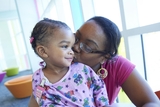Center for Thoracic Insufficiency Syndrome at CHOP
Joey’s Dad: I've never seen anyone meet Joey and not be in a better mood.
Joey: Do you hear my sister? Ava … peek‑a‑boo!
Joey's Mom: Nurses would just fight over the chance to take care of him because he was just so cute and so sweet.
Fajer's Dad: This is my daughter, Fajer Alkhaledi from Kuwait. She likes to be a leader. She has a very strong will. If she wants to do something, she can do it.
Matthew: I'm Matthew. I'm 12 years old. I love sports. I watch it all the time.
Matthew's Dad: What's your favorite sports team?
Matthew: The Bills and the Notre Dame Fightin' Irish.
John's Mom: This is my son John. He wants a jeep.
John: Yeah. I already got my permit. My mom's scared about that. And…
John's Mom: Every mom is scared about driving!
John: Yeah.
Patrick J. Cahill, MD: Thoracic insufficiency syndrome covers a lot of different conditions. Basically it's the inability of the chest to support normal pulmonary function or pulmonary development. And that means their lungs won't be able to work as well and support them throughout their lives. And so for the vast majority of them, that means a shorter life. It's really a life and death issue.
Joey's Mom: We found out that we were pregnant and they explained to us that his levels were high for a neural tube defect.
Fajer's Dad: Fajer had some respiratory problems since birth. And she had also lot of problems with her vertebral column.
Matthew's Dad: Matthew was diagnosed with SMA when he was a year and three weeks. If a normal rib cage looks like this [hand motion] his rib cage were started to look like this [hand motion]. So they were sort of falling down on each other.
Joey's Mom: His stomach, his insides, and everything were just…
Joey's Dad: Squashed down…
Joey's Mom: a crinkled mess.
John: It was hard for me to eat because I couldn't like fit like so much food in my belly and then it was hard for me to breathe cause my spine was just crumbling inside of me and it's just like that pain.
Fajer's Dad: For 12 years, I kept seeking treatment in many, many hospitals but I couldn't find good treatment.
John's Mom: Right before he turned 3, we were told he only had like, a month to live. People at the hospital said go home, here's a tank of oxygen. You know, tell John's sisters it's coming and we're done.
Joey's Mom: And at this time we were living in Georgia so we decided that we would find answers elsewhere so we got on the Internet and Googled and found CHOP and we literally loaded our car up and never went back.
Robert M. Campbell, MD: Hey tiger, how you doin'?
We are the biggest and the best center in the world for treatment of thoracic insufficiency syndrome. We have usually, at one time, 200 to 250 families that we take care of.
Boy you're a tough guy.
John's Mom: It was like, oh my gosh, they've got this Dr. Campbell there. He has this thing called the VEPTR. You put it in, and you can continue to grow.
Patrick J. Cahill, MD: The VEPTR is an acronym for Vertical Expandable Prosthetic Titanium Rib. And it affixes to the ribs generally at the top of the chest, in the back. And then it can attach to the pelvis or the spine below that.
Dr. Campbell: It expands outward to mimic the width of a normal child's chest.
Dr. Cahill: Or if there's scoliosis, the VEPTR can then be used as a jack to straighten the spine out and keep it straight as the patient grows.
Matthew's Dad: He really thought through what Matthew could need, and what were going to be his long-term challenges and how the VEPTR might help those.
Dr. Campbell: We've gotta watch out for when they're 50 and 60. We want them to have a good pair of adult lungs to do what they want out of life.
Dr. Cahill: While we're leaders in the use of the Vertical Expandable Prosthetic Titanium Rib or the VEPTR, we also use serial body casting, traditional growing rods, we do spinal fusion surgery, magnetically expandable growing rods and most recently, we're starting a prospective trial on vertebral tethering.
Oscar H. Mayer, MD: One of the unique components of this program here is the depth of the multidisciplinary component. It's important because with chest wall and spine deformity, you can obviously have respiratory difficulty which is why I'm part of this, but then you can have significant problems with cardiac function so we have a cardiologist involved.
Matthew's Dad: Life is busy. And when you have a really top notch multiple disciplinary team, like they do at CHOP, it's just a pleasure to be able to navigate everything together.
John's Mom: I'm like OK so, you're gonna coordinate. Do we need to call Dr. Hannah and Dr. Mayer and tell 'em what you said and da, da, da. And he just looked at me and he's like 'Well no we, we're all gonna meet and talk about John.' And we were like…
John: We were like: What is this? Like this has never happened.
John's Mom: We're gonna come up with a plan, and then we'll present it to you. This is what we all agree on.
Matthew's Dad: It makes it more simplistic. And it also means that when there are things that no one's really sure about who's responsible for what, they're talking to each other.
Joseph M. McDonough, MS: Different components of tidal volumes from the left and right could perhaps help.
Dr. Campbell: You know, Jay, you're right.
Dr. Campbell: We just have a brain trust here of talented people who've been pushing the envelopes all their careers. If I need to talk to the world’s expert on anything, I walk down the hall and find him or her.
Dr. Cahill: Mike, what about the physiology of putting kids under anesthesia?
Michael L. Nance, MD: I think you would go earlier.
John's Mom: And to see them all together is really neat. They can disagree with each other but they're not arrogant about it. And then, in the end, they really did what was best for John.
Dr. Campbell: And I tell ya, I've talked to many of my families whose children I operated on when they were infants 20, 25 years ago. They all said their kids wanted a chance. They're not asking to live to be 100. They just wanted a crack at life.
Dr. Cahill: Molly's surgery went great. We did everything we hoped to achieve.
Joey's Dad: We saw the results after the first surgery pretty much immediately with breathing better. Eventually coming off the NG tube that he had had.
Fajer's Dad: Previously, she was very thin and very weak. Now she gained a lot of weight and she grown up.
Matthew's Dad: So he had his initial implant in January 2012 and this [hand motion] fall down phenomenon very quickly went back to this [hand motion].
Matthew: I can hold my breath longer than I could before.
Matthew's Dad: When you're screaming at your mom or your dad, you can scream much more loudly, right?
Matthew: Exactly.
John's Mom: It's crazy the day after a major surgery like this, they have you up and out of bed. And I don't know if you remember you got up, we were eye to eye, for the first time. He could look me in the eye.
John: It was great.
John’s Mom: Can you imagine waking up four inches taller?
John: Finally taller than my grandmother.
Matthew's Dad: Because he feels, sort of, more normal, his desire to want to do and try other things also helps. We go to sporting events together and he doesn't feel hindered or held back by any of those things at all.
John's Mom: The back surgery has led to so many other things, you know, the self confidence. Old John would not have sat here and talked about this because he wasn't happy about it. Now he's like 'I gotta tell everybody'. This is great!
Joey: Mommy? Were you just joking that Daddy was gonna be at a party for me?
Joey's Dad: No, there's gonna be a party.
Joey: For real?
Joey’s Dad: For real.
Joey: Where?
Joey's Dad: Downstairs.
Joey: A giant party!
Nicole J. Schenk, RN, MSN, CRNP: Every year we have a day where we celebrate all of the patients in the Center for Thoracic Insufficiency Syndrome. We invite all of the families and a lot of families do travel from far away to come to it.
Dr. Campbell: It's been wonderful watching you grow up, get stronger.
John's Mom: They're a family here. And we're so happy we found them.
Dr. Campbell: And I wanna acknowledge the heroes which are the parents. You sacrificed a lot to make this happen.
John's Mom: It's changed not just his life, it's changed my life too.
John: I'm now allowed to like, go everywhere without my mom and all that.
Joey's Dad: I don't know that he would have made it to double digit age without the VEPTR. And certainly not as he is. Especially not as he is.
Fajer: I like Dr. Campbell very much. He's one of the best surgeon in the world. And I would like to be an orthopedic surgeon like him.
Joey's Dad: My greatest hope's just that he's not defined by his disability.
Joey's Mom: I just want him to succeed. I want him to have every opportunity he can have in life.
Fajer's Dad: I hope she keep improving in her health and I hope that all the patients can take Fajer as an example of being strong as her. I want them to have hope like she had hope.
Dr. Campbell: Every spring, I get cards from my patients that I operated on when they were infants, for high school graduations, college graduations. And these were children who were uniformly felt to be not survivors when they were born. They got their chance.









